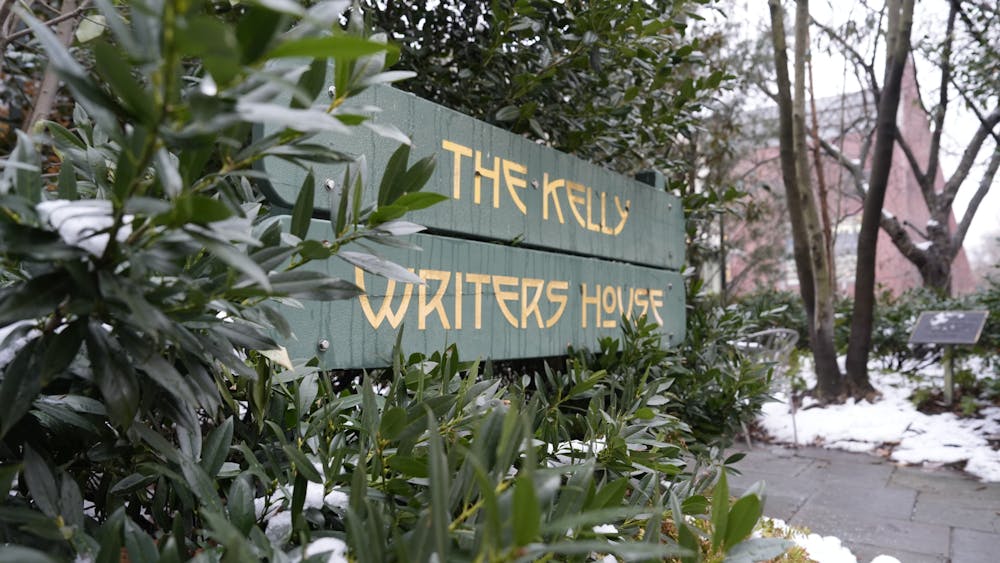
Journalist and author David Browne discussed his latest book, "Talkin' Greenwich Village: The Heady Rise and Slow Fall of America's Bohemian Music Capital," which explores the complex history of Greenwich Village’s music scene, at an event hosted by Kelly Writers House on Feb. 27.
Browne read excerpts from his book and detailed sources of inspiration for the story in a discussion moderated by Anthony DeCurtis, a distinguished lecturer in the creative writing program. Kelly Writers House sold copies of the novel and held a small reception after the event.
In an interview prior to the event, Browne detailed how he became intrigued by the music scene in Greenwich Village.
“I moved to the Greenwich Village when I was in college, and started going to a lot of concerts there and got exposed to the music scene. And it just felt like it was time to write a book about that scene, because no one really had and talking about the whole history of it,” Browne told The Daily Pennsylvanian. “It felt like a good time to kind of explore the whole ups and downs of the whole music scene there in a way that hadn't been done yet."
Throughout the conversation, Browne traced the evolution of the Village’s music scene from its folk revival roots to its influence on contemporary musicians.
“You're seeing a new generation of singer-songwriters who are kind of going back to some of those styles, whether it's, you know, some of the women and boygenius, or a new guy named Jesse Welles, who sings kind of modern protest songs," Browne said. "So I think there's a continuing allure to [...] the legend and the mythology of the Village, and what it contributed."
Browne read an excerpt from his book detailing a pivotal moment in the Village’s history — the 1961 crackdown on folk musicians in Washington Square Park.
“The site of Easton being arrested, only egged on the protesters who sat down in the dry fountain and began singing the Star Spangled Banner, the black spiritual 'We Shall Not Be Moved,' Woody Guthrie's 'This Land Is Your Land,' and other songs,” Browne said, adding that the city’s attempt to suppress public performances led to a protest that became a defining moment for the folk revival movement.
The discussion also touched on the Village’s broader cultural significance, including its connections to the emerging music stars, Beat poets, and jazz.
“It was a place where Bob Dylan could write a seven-minute song like 'A Hard Rain's A-Gonna Fall' upstairs at the Gaslight, and then when it was time to play at the open mic night, he would just go downstairs and play this seven-minute song,” Browne said.
In addition to his reflections on the past, Browne also spoke about the economic challenges that have made it difficult for music scenes like the Village to thrive today. He noted that rising rent prices and the changing nature of the music industry have forced many artists to seek alternative spaces.
“For a while, it was Williamsburg in Brooklyn. There was a scene there, but it’s so expensive to live there now,” Browne said. “People ask me if the Village is going to come back, and I don’t know if you can even answer that. You would need a completely different financial environment.”
Despite these challenges, Browne remains hopeful that new creative communities will emerge. He pointed to past music scenes, like Athens, Ga., which produced bands like R.E.M. and the B-52s, as proof that great art often emerges in unexpected places.
“One thing about music scenes is you never know when they’re going to come out of nowhere,” Browne said. “It was the same with Athens, Georgia. Nobody thought it would be a hotspot, but suddenly there was this explosion of talent.”
Priyanjali Sinha, a College of Liberal and Professional Studies student, shared her opinion on the economic and cultural shifts that have changed the Village over time.
“I didn’t know anything about Greenwich Village and I just wanted to learn more about this part of history,” Sinha told the DP. "[It's interesting] how the economic context in New York was different and accessible and how it was a place where a lot of people could make music affordably. I think the question is what's next in terms of places like Greenwich Village."
The Daily Pennsylvanian is an independent, student-run newspaper. Please consider making a donation to support the coverage that shapes the University. Your generosity ensures a future of strong journalism at Penn.
Donate







